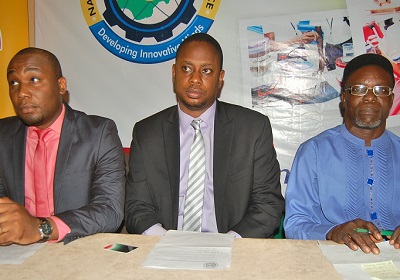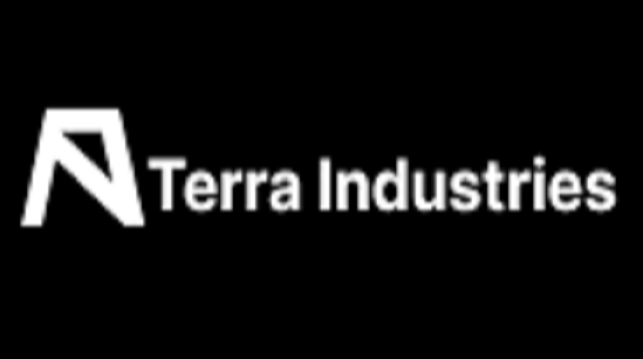E-Business
Akwa Ibom Partners Intel, Others for National School Science Fair

The National School Science Fair, which brings together secondary school students from across the country, will be hosted by the Akwa Ibom State Government this year.
The event is sponsored by Shell Petroleum Development Company (SPDC), Intel Corporation, and Interswitch.
The commencement of the Science fiesta was announced at a press conference held in Uyo Akwa Ibom, State.
The Fair will accommodate pupils from the thirty-six (36) states plus the FCT Abuja and will give them the opportunity to showcase their independent research projects and inventions, as they try to solve the challenges faced in their local communities.
Science teachers who accompany the students to the Fair will participate in a one-week Science Educator Academy, where they will learn about current trends in Science, Technology, Engineering and Mathematics (STEM), including project management and mentoring of young scientists.
Nedo Osayande, SPDC’s general manager, Sustainable Development and Community Relations, said: “We’re pleased to be part of the success of the National Science Fair. We believe that, by encouraging the young ones to take interest in science subjects, we will be laying a solid foundation for the technological development of Nigeria. This has also informed the different educational programmes that SPDC and other Shell companies in Nigeria are implementing in the Niger Delta and throughout the country”.
Olubunmi Ekundare, country manager, Intel Nigeria, while explaining the mechanics of the competition stated, “We encourage interested students to submit their original research work. The best six (6) projects will qualify to feature at the Intel International Science and Engineering Fair (ISEF) which will holds in Los Angeles from May 11-16 2014. Over 4 million dollars in prizes and scholarships will be awarded to winners.”
Also speaking at the conference, Mitchell Elegbe, group managing director, Interswitch Transnational said that the fair is an excellent opportunity for young Nigerians to exhibit their inherent skills and demonstrate the huge potential the nation offers.
“Interswitch proudly supports the National Festival of School Science Quiz and Fair competition. We remain committed to providing people development platforms that would help young Nigerians play active roles in national development in technology and beyond. This is quite essential as Nigeria strives towards becoming one of the Top-20 world economies by 2020,” he said.
As host to this year’s Fair, Engr. lboro Ekanem, commissioner for Science & Technology, Akwa Ibom State, said, “Nigerian students have consistently given a good account of themselves at International Fairs. I am certain that the successful winners of the National School Science Fair will excel at the 2014 Intel ISEF.”
Speaking further, the Fair’s organiser, Genius Illumina, represented by the Executive Director, Dr Jerry Orhue, said, “For us at Genius Illumina, it’s been ten years of unbroken commitment to the promotion of excellence in Science and Technology Education. Ten years ago, we stood alone, but today, we are grateful to have giants standing by us. We remain highly indebted to our financial partners – SPDC, Intel and Interswitch, who through their commitment to the Nigerian child have continued to put their money behind our noble dream. We look forward to many more years of working together with them for the good of tomorrow.”
The National School Science Fair, which began in 2004, is designed to gradually transform every student into a researcher and teach students to see themselves as part of solutions to societal problems. It is expected that this year’s event will see even more daring science projects from participating students than in the previous years.
E-Business
Nigeria Targeted with 4,622 Cyber-attacks Per Week in December 2025

In December 2025, organisations globally faced sustained cyber pressure, as the average number of cyber-attacks per organisation per week reached 2 027, a 1% increase from the previous month and a 9% increase from December 2024.

This is according to December 2025 Global Cyber Attack Statistics by Check Point Research, the threat intelligence arm of Check Point Software Technologies.
According to the statistics, Latin America was the hardest hit, with companies experiencing an average of 3 065 cyber-attacks per week, a 26% year-over-year increase.
In contrast, Africa saw a decline in attacks, with Nigeria (4 622 attacks per week) and Angola (4 002 attacks per week) being the most targeted countries on the continent.
The report’s findings highlight the evolving cyber threat landscape, with ransomware and GenAI-driven data risks posing significant challenges to companies worldwide.
Ransomware attacks jumped 60% year over year, with 945 publicly reported incidents in December. Qilin was the most active ransomware operator, responsible for 18% of publicly disclosed attacks.
“Ransomware continues to scale through industrialised operations, while unmanaged GenAI usage is creating widespread data exposure at enterprise level,” said Omer Dembinsky, data research manager at Check Point Research.
The report noted the education sector was the most targeted industry globally, with 4 349 cyber attacks per week; followed by government (2 666 attacks per week); and associations and non-profits (2 509 attacks per week).
The widespread adoption of GenAI tools has introduced new cyber security risks, with one in 27 GenAI prompts posing a high risk of sensitive data leakage.
Experts warn that companies must prioritise prevention-first security, real-time AI threat intelligence and strong governance over AI tools to mitigate these risks.
Hendrik de Bruin, head of security consulting at Check Point Software, added: “Strengthening ransomware resilience, deploying AI-powered prevention and enforcing clear GenAI governance will be critical to reducing cyber risk in the year ahead.”
E-Business
Half of Global Companies Build SOCs to Enhance Cybersecurity, with a Focus on Human Expertise

Among the primary reasons for establishing a Security Operations Center (SOC) are strengthening cybersecurity posture, enabling faster detection and response and gaining a competitive edge.

Interestingly, despite the increasing demand for automated cybersecurity solutions, businesses rely on skilled security professionals to make key decisions, as human expertise remains essential for effective security management.
A Security Operations Center (SOC) is a dedicated organisational unit responsible for continuous monitoring and safeguarding of a company’s IT infrastructure. Its core mission is to proactively detect, analyse and respond to cybersecurity threats.
To identify the main drivers, strategic priorities, and potential challenges in SOC planning and implementation, Kaspersky has conducted a comprehensive global study involving senior IT security specialists, managers and directors from companies with 500 or more employees.
All participants operate without a SOC but have plans to establish one in the near future. The study spans 16 countries across APAC, META, LATAM, Europe, and Russia, providing valuable insights into the emerging trends and best practices in SOC development worldwide.
The findings of the research reveal that 50% of companies intend to establish SOCs to strengthen their cybersecurity posture, and 45% are motivated by the need to address increasingly sophisticated and dangerous threats.
Other drivers include budget optimisation, the necessity for faster detection and response, and the expansion of software, endpoints and user devices – factors that demand more comprehensive and layered security measures.
These are cited by 41% of organisations. Additionally, 40% seek better protection of confidential information, 39% aim to meet regulatory requirements and one-third (33%) expect SOC capabilities to provide a competitive edge. Larger enterprises tend to cite each of these reasons more often, reflecting the broader operational and regulatory pressures they experience.
Continuous monitoring becomes the leading SOC requirement
Among the key functions organisations plan to delegate, 24/7 security monitoring leads at 54%. This around-the-clock vigilance enables early detection of anomalies, prevents escalation and sustains cyber resilience in real-time. This demand highlights a strategic requirement for proactive risk management, as organisations aim to defend against persistent threats that can strike at any moment.
Companies intending to fully outsource SOC operations show a stronger interest in applying “lessons learned” methodologies, whereas those developing internal SOCs focus more on access management to maintain tighter control.
Human expertise drives SOC technology choices
While SOCs use advanced technology, the choices made by organisations show that human analysts are very important. Among the solutions that organisations plan to include in SOC are – Threat Intelligence Platforms (48%), Endpoint Detection and Response (42%) and Security Information and Event Management systems (40%) – sophisticated solutions that automate data collection and reduce operational load, however, they depend heavily on skilled security professionals who provide critical context, interpret complex findings and make final decisions when guiding appropriate responses.
Other solutions chosen include Extended Detection and Response (38%), Network Detection and Response (37%) and Managed Detection and Response (33%). Large enterprises tend to adopt more technologies (5.5 per SOC on average), while smaller ones integrate fewer (3.8).
“To successfully build a SOC, companies must prioritise not only the right mix of technology but also the careful planning of processes, clear goal-setting and effective resource distribution.
“Well-defined workflows and continuous improvement are essential to ensure that human analysts can focus on critical tasks, making the SOC a proactive and adaptable component of their cybersecurity strategy,” comments Roman Nazarov, Head of SOC Consulting at Kaspersky.
E-Business
Nigerian Terra Industries Secures $11.8m for Expansion

Terra Industries, a Nigerian defence technology startup, has raised $11.75 million to expand its development of defensive systems that protect critical facilities across Africa.

The fundraising round was led by Silicon Valley venture firm 8VC, which was founded by Palantir co-founder Joe Lonsdale.
Other investors in the round include Valour Equity Partners, Lux Capital, SV Angel, and Nova Global, as well as African-focused funds Tofino Capital, Kaleo Ventures, and DFS Lab.
Terra Industries, founded in Abuja by Nathan Nwachuku and Maxwell Maduka, provides multi-domain security solutions for both air and land. Its solutions are intended to detect and respond to threats including terrorism, sabotage, and armed attacks on infrastructure.
The company’s product portfolio includes surveillance drones, ground-based robotic systems, and fixed monitoring towers deployed around sensitive locations.
Co-founder and CEO Nathan Nwachuku said the company has now fully embraced its identity as a defence-focused startup, citing the growing urgency of security challenges across Africa.
He said safeguarding critical infrastructure from terrorist threats has become unavoidable.
Nwachuku argues that protecting Africa’s infrastructure requires a different approach, one that combines local manufacturing, end-to-end system control, and software capable of independently identifying and responding to threats over large areas.
The company aims to position itself as a defence prime, similar to the role played by firms such as Anduril Industries and Palantir in the United States.
Nwachuku also disclosed that the company had earlier raised $800,000 in pre-seed funding.
With the new funding, Terra plans to increase manufacturing capacity within Africa, establish additional defence production facilities, and expand its artificial intelligence and software teams.
While software offices are planned for San Francisco and London, the company said manufacturing operations will remain on the continent.

 General News2 days ago
General News2 days agoPalmPay, Premier Cool to Reward 10,000 Nigerians with ₦100m in “10k for 10k Campaign”

 E-Financial2 days ago
E-Financial2 days agoEcobank Joins Trillion-naira Club for the First Time in 20 Years

 E-Business2 days ago
E-Business2 days agoKaspersky Warns Telecom Threats from 2025 will Carry into 2026 as New Technology Adds New Risk

 E-Business2 days ago
E-Business2 days agoNigerian Terra Industries Secures $11.8m for Expansion

 E-Financial1 day ago
E-Financial1 day agoAngst as FG Demands 7.5 Percent VAT on Mobile Bank Transfers, USSD

 Telecom2 days ago
Telecom2 days agoSHELT Named in Prestigious 2025 MSSP 250 List for Cybersecurity Excellence

 News1 day ago
News1 day agoMoniepoint Launches Second Cohort of DreamDevs Initiative to Double Down on Africa’s Tech Talent Pipeline

 E-Business1 day ago
E-Business1 day agoHalf of Global Companies Build SOCs to Enhance Cybersecurity, with a Focus on Human Expertise



























